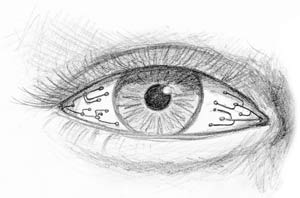

Overpriced Musings: Computers
Under Your Skin?

E-Mail Us
Your Comments
|

art/Marty Kelley
Computers Under Your Skin,
for Godssakes!
THE DAY IS FINALLY HERE. Millions of years of human evolution have brought us to this milestone, one that perhaps does not advance human technology all that much, but that has more significance than most inventions that have come before.
There are now identification microchips that are ready to be placed inside the human body. This is no drill, comrades. This is it. A Florida company, Applied Digital Solutions, has developed a product called "VeriChip." The company is planning to request approval from the Food and Drug Administration to begin implanting the chip in human beings very soon. Smaller than a dime, its purpose is wholly medical and accepting the device will be completely voluntary. It will contain data about a patient's medical history and information about any allergies or medications the patient may be taking, and it can only be read by a certain type of scanner that the company hopes to deliver free to hospitals and ambulance units. The benefit would be instant knowledge for health care professionals about how to treat people.
 Good intentions aside, a chip such as this can have but one purpose when all the sugarcoating is removed: Identification. This chip contains a number, and when activated by the energy of the scanner, the chip transmits its unique identifier number to the scanner, linking you to a larger database. It allows other people to know exactly who you are without tapping into your brain for the answer, and without the risk of inaccuracy.
Good intentions aside, a chip such as this can have but one purpose when all the sugarcoating is removed: Identification. This chip contains a number, and when activated by the energy of the scanner, the chip transmits its unique identifier number to the scanner, linking you to a larger database. It allows other people to know exactly who you are without tapping into your brain for the answer, and without the risk of inaccuracy.
As I was growing up absorbing all sorts of cyberpunk in films and television, I'd always taken comfort that the issue of "tagged" human beings was something off in the somewhat distant future. Like any horrific monstrosity yet to come, it was healthy to talk about it, to create art about it, to appreciate the arguments against it and to avoid the mistake of actually doing it. And I was never much worried about this issue, because I thought there would be such a backlash against it when it finally came that it would never be properly implemented. I thought it to be so much of a no-brainer that society at large would reject it outright.
It remains to be seen what society's reaction will be to this. The optimist in me hopes there will be massive dissent. It looks unlikely, though; because there are people already lining up to accept this new chip, ready to be the first persons to be tagged. They are the people for whom the thought of a lightning-quick diagnosis of their condition is too appealing to resist. For them, the need is too great, and thus, they become the first unwitting foot soldiers of a much greater movement.
It is the opinion of this columnist that accepting some digitally encoded device into your body is utterly dehumanizing. When you have a device that makes you into a walking receiver/transmitter, you become some sort of eerie human-plus, separate from all the rest. And humans typically don't like being apart from the general consensus of the rest of the population, especially not when there is a quality of life issue involved.
The biochip will not remain a medical device. Not when there is so much potential for efficiency inherent in its very existence. It will have customer service applications and location tracking applications. Once these human-plus folks start catching on, and everyone sees how "neat" it is, it will become like the cellular phones of today. Implanted people will have a distinct advantage. People will look at you in amazement when you tell them that you have no biochip. "You have no biochip? Are you some kind of crazy Luddite?"
The pressure will soon mount for all persons to be implanted, not just from already-implanted friends and not necessarily from government, but from business--the real government. Business will make it so incredibly convenient for you to have a biochip that nobody will have to force you to accept one; you won't be able to resist the new world of joyous free time you'll have! You'll be able to check your groceries out in eight seconds, reducing the time it takes to serve and be served at checkout lines. You'll be able to pay tolls to cross bridges and expressways without having one of those cumbersome devices on your windshield or an unsightly barcode on your bumper. You won't even have to slow down! The police will be able to rush to your aid in an instant when you need assistance, reducing crime a thousand fold. As for your children--you'll never have to stay up until two in the morning wondering where they are, nor will anyone ever pull off a successful kidnapping. It's a win-win situation for everyone.
And hey, as long as everyone's got a biochip, let's use it for our national identification system. Why not? It's a tried and true method of unique identification anyway. It's not easily removed or duplicated, and the records in the national database will not be easily tampered with.
"It's what we call function creep," says Lee Tien, a senior attorney for the Electronic Frontier Foundation, a privacy advocacy group. "At first a device is used for applications we all agree are good but then it slowly is used for more than it was intended."
Like anything business wants you to have (it is, after all, not just their job to fulfill existing wants but to create new wants,) they will make sure you want it. Badly. With a 90-day money back guarantee.
Let us all make sure that when it comes, no matter how much we want it, we don't really want it.
•
Email your feedback on this article to editor@impactpress.com.
Make an IMPACT
Other Overpriced Musings by Don Pflaster:
|




